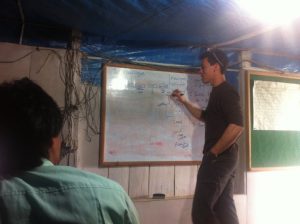A SOCAP Guest Post By: Bea Hart and Mark Horoszowski of MovingWorlds
“talent, not capital is the key factor linking innovation, competitiveness and growth in the 21st century” – World Economic Forum
At SOCAP16 there was a lot of talk about building the skills and talents of social entrepreneurs. Beyond access to financial capital, social change leaders need the skills, know-how, and connections to scale their enterprises – and industry leaders are taking notice.
“It used to be an issue of access to capital, now it’s an issue of access to talent.” -Haynie on entrepreneur needs #SOCAP16 #dc #impacthub
— Agora Partnerships (@AgoraPrtnrships) August 19, 2016
SOCAP16 speakers talked about holistic approaches to development and leveraging experienced talent. Conference attendees clustered in hallways and spoke about the need to focus more on addressing the “skills gap” of social entrepreneurs, but these conversations about capacity building were not unique.
The last few ANDE reports have all highlighted the importance of addressing talent shortages, the new UN Sustainable Development Goals (specifically #17) call for targeted capacity building, and nearly every social enterprise accelerator – like Agora Partnerships, Village Capital, Unreasonable Institute, and Fledge – are quick to emphasize the skills transfer that occurs in their programs. A new report from the INGO Impact Investing Network specifically recommends “Providing capacity development services for social entrepreneurs, impact investors, or other NGOs”.
All these organizations are focusing on talent building for a good reason. As the 2014 ANDE report points out, the “capacity gap” is the leading barrier to progress in some countries. In many others it is second to “access to capital” as the the biggest stumbling block for changemakers. In fact, according to The International Finance Corporation (IFC) ”Capacity building is one of the least understood yet most important aspects of development work.”
But talking about building talent and actually doing it are two very different things. The Harvard Business Review has highlighted that there is a lack of capacity in this sector, and no one is investing in building it.
So at SOCAP I took some time to talk with partners about ways to build talent and found that there are a variety of cost-effective and innovative ways that social entrepreneurs can build their own talent, and the institutions investing in them can help.
5 Cost-Effective Ways to Build the Capacity of Social Entrepreneurs
1. Get Feedback to Learn Priority Development Areas
Entrepreneurs are not great at identifying their development areas. Most leaders aren’t. Just like corporations use comprehensive 360 feedback reviews and holistic assessment to prioritize growth areas of their employees, social change leaders should do the same.
Village Capital, Fledge, and Agora Partnerships – all accelerators for social enterprises – use mentor sessions and/or peer-based networking to help evaluate gaps and share expertise.
Social Entrepreneurs:
 Seek feedback from teammates, partners, vendors, and mentors about you and your team’s development areas.
Seek feedback from teammates, partners, vendors, and mentors about you and your team’s development areas.- Be persistent in getting feedback from accelerators or investors (selected or not) about the skill shortages flagged for your team.
- Ask your partners, beneficiaries, vendors, and other stakeholders for feedback as to how you can grow as a leader to better support and partner with them.
Investors & Accelerators:
- During application phases, capture and share feedback about the skills and experience the review team feels the social entrepreneur(s) needs to develop.
- Work to connect applicants to skill-specific mentors (as opposed to general mentoring around a business model).
- Aggregate collected data about the talent needs of all applicants to your programs/funds, and work with partners to host and deliver skill development workshops.
2. Build Learning Circles
Learning doesn’t happen overnight, and it’s hard to do it alone.
Groups like ImpactHub and iHUB are known for curating events for changemakers to get together so they can learn. Here is a sample iHUB event co-sponsored by ANDE in Nairobi.
- Creating or joining a group, formal or informal, will make you more accountable and garner more wisdom from the crowd.
- If you work at an accelerator, co-working space, or in a hub with other activity, create opportunities to be in the same space and talk about learning areas; similar to how companies host learning brown bag lunches.
Investors & Accelerators:
- Ensure individuals that are accepted into programs take an audit of their learning needs, and then connect with others that are developing and embody those skills.
- Connect the leaders that are NOT accepted and encourage them to get together to share their growth areas.
3. Make Time for Free, Online Learning
There are a variety of resources to help people learn. Online learning programs (i.e. Coursera, LastMileLearning, or TechChange), certificate programs (most universities), and of course, more content than you can ever consume for free via online publications: (i.e. SSIR or HBR), blogs, videos, forums, and more.
When we started MovingWorlds, we had weekly “Accountability-buddy” sessions by convening some peers together at a local cafe to each take time to invest in our own learning.
- After working with mentors, investors, and peer-based groups to determine which skills need development, find the right online tool to develop it.
- Provide budget for yourself and team members for one skill development opportunity per quarter.
Look to the +Acumen community, a great place to learn skills and techniques if you don’t have your own network.
Investors & Accelerators:
- Set aside time for “learning labs” where people can convene and each take their own online courses, using the in-person accountability to ensure completion
- Conduct research for the types of in-person and online events that are most relevant to the organizations in your cohort, and work to arrange group deals for them to attend them together.
4. Connect to Skilled Professionals for Mentoring, Coaching, and Skilled Support
There are vast networks of skilled professionals eager to volunteer their expertises, in-person and/or virtually. These professionals can lead trainings, conduct consulting assignments, or even join your team for a short-period to help reach a deliverable.
Siemens Stiftung Empowering People Network has a program with MovingWorlds to find Experteering professionals eager to travel and volunteer their expertise.
- Look to engage skills-based volunteers (aka Experteers) to lead training on specific skills and support your organization on skills-based challenges.
- Tap into virtual mentoring networks (MicroMentor or Taproot+ can help).
Investors & Accelerators:
- Set aside extra budget for learning opportunities.
- Build partnerships with corporate and professional networks so your organizations can access specific skills and connections with groups like SOCAP
5. Use Informal Coaching & Peer-Based Feedback from Your Team and Peers
More than any other method, people learn the most through their experiences, provided they engage in deliberate practice: Meaning they set goals, practice, reflect on their experience, think forward to what they’ll do better next time, try again, reflect, and so on.
Village Capital uses an innovative and proven model for having its entrepreneurs engaged in peer feedback.
Social Entrepreneurs:
- Set goals for your learning activities (and yes, writing down your goals helps you achieve them).
Reflect on your experience and continue to work at improving it, use your mentors and peers to help you think through your goals
- Become a coach to your peers using the easy to follow GROW model (use this introductory video, see it in action, and read this article).
Investors & Accelerators:
- Hold social enterprise leaders accountable in quarterly and/or yearly reviews on the skills they are working on, and the methods they are using to develop them.
- Provide extra connections and budget to make sure your leaders have a coach – networks like MovingWorlds and accelerator networks are organizations that enable you to tap into large professional networks to access expertise for your field organizations.
As this report from Venture Philanthropy Partners – in partnership with McKinsey Consulting – points out:
Prudent leaders…will recognize the importance of building organizational capacity from the very start and make it the hallmark of their tenure. They do not wait for a crisis before addressing capacity gaps; rather, they will aggressively seek out those gaps and take measures to fill them. Capacity building does matter, and it does make a difference… and the sooner funders increase their support for capacity building efforts, the better off – and society as a whole – will be.
If you’re interested in improving the talent building industry, let us know – we’re looking for partners to help improve the way social enterprises identify their biggest talent gaps, and the way industry partners support them in addressing those gaps.
This post was authored by Bea Hart and Mark Horoszowski of MovingWorlds.org: A global platform that helps social enterprises access professionals that are looking to travel and volunteer their real skills to support social good, either on their own or through corporate sponsored programs.


Learn about Experteering on Twitter (@Experteering), Facebook, online, or contact mark@movingworlds.org for more information.






